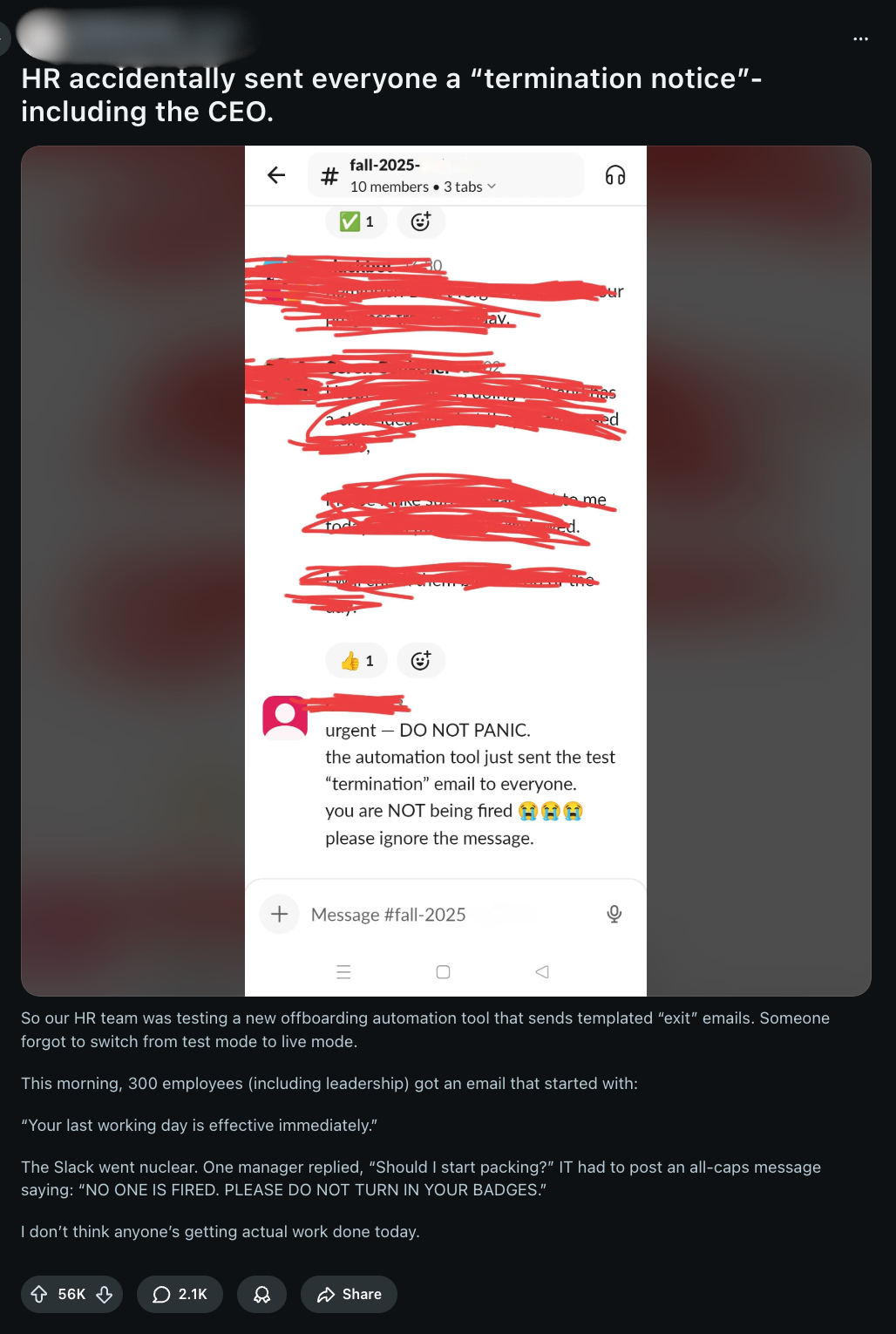
A Reddit post recently went viral after a company’s HR team accidentally triggered what can only be described as mass panic. The team was testing a new offboarding automation tool meant to simplify exit processes. Someone, however, forgot to switch the system from test mode to live mode. The result? All 300 employees received a stark email stating: “Your last working day is effective immediately.” Yes, that included the CEO.

Viral Reddit post describes when HR accidentally sent termination notices to 300 employees, including the CEO.
Pandemonium in the workplace
Slack exploded almost instantly. Managers messaged their teams asking if they should start packing, while employees debated whether it was a glitch or a serious termination notice. IT had to intervene with an emergency all-caps message: “NO ONE IS FIRED. PLEASE DO NOT TURN IN YOUR BADGES.” Meetings stalled, deadlines were ignored, and productivity hit a hard pause. For a few tense hours, the office felt like a mix of chaos, confusion, and disbelief.
Reddit weighs in
As the story made its way online, Reddit users had plenty to say. Some asked why any company would test a tool capable of firing everyone at once. Others wondered if relying on such automation hinted at bigger issues within the organization. But most reactions leaned on dry humour and sarcasm. Memes, jokes, and wry one-liners quickly transformed the tense scenario into shared comedy. The incident also highlighted a unique trait of today’s workforce: even when faced with a potential career crisis, employees often respond with calm, detachment, and humour instead of full-blown panic.
Career lessons hidden in chaos
Even in the middle of a workplace meltdown, there are valuable takeaways. How employees and organisations respond to unexpected shocks can reveal insights about resilience, communication, and long-term career success.
Double-check automation
Automation tools are meant to make work faster and smoother, but they’re only as reliable as the people using them. One wrong click can spark confusion, panic, and a total drop in productivity. Always double-check settings, run tests in isolated environments, and get a second pair of eyes on critical workflows. Technology can help, but it can’t replace careful human oversight.
Humour is a survival skill
How people respond in a sudden crisis can completely change the mood. In this case, employees turned to jokes, sarcasm, and playful banter to diffuse tension and keep perspective. Humour didn’t ignore the problem—it created a buffer, stopping panic from spreading like wildfire. For professionals, it’s a reminder that even in stressful moments, keeping a sense of humor can help you navigate uncertainty without losing your composure.
Communication matters
Clear, fast, and transparent communication is key when chaos hits. IT and management jumped in quickly to clarify that no one was actually being fired, but the situation shows how delays or vague messages can make stress worse and rumors run rampant. Organisations that prioritise timely updates, open channels for questions, and honest messaging turn potential panic into calm understanding. In a crisis, how you communicate matters just as much as what you communicate.
Understand company culture
How a company responds to mistakes often says more than its policies ever could. Here, the way leadership handled the accidental email by reassuring employees, clarifying the situation, and managing the fallout revealed priorities, accountability, and problem-solving approach. For anyone building a career, watching how a company reacts to errors can tell you a lot about its stability, reliability, and overall workplace culture.
Takeaway for today’s professionals
In a world where messages spread instantly and one Reddit post can go viral overnight, a single email can dominate workplace conversations. What stands out, however, is how employees reacted. Sarcasm, dry humor, and quick reassurances became the unofficial coping strategy. The incident shows that today’s professionals often approach career shocks with wit, calm, and a sense of perspective rather than alarm—a reminder that sometimes, how you handle the panic is just as important as the panic itself.





